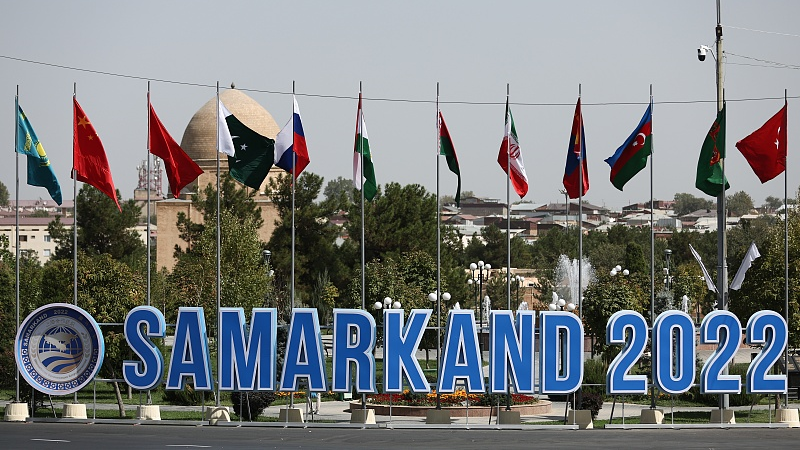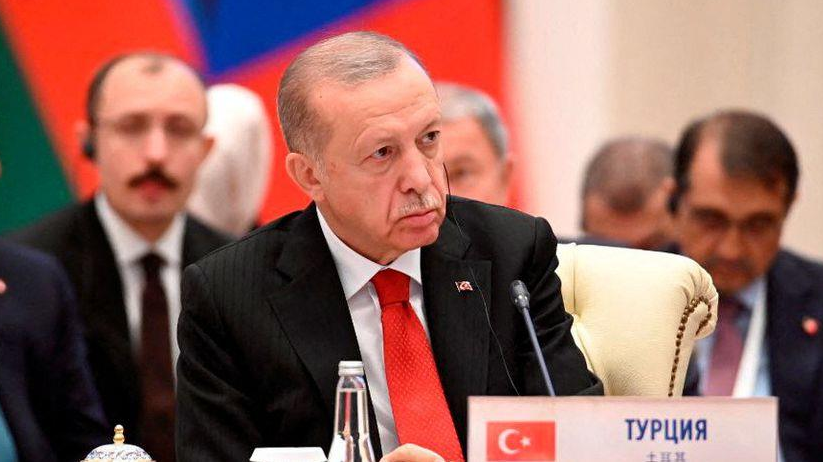
National flags fly in the city's center ahead of the 22nd Meeting of the Council of Heads of State of the Shanghai Cooperation Organisation, Samarkand, Uzbekistan, September 15, 2022. /CFP
National flags fly in the city's center ahead of the 22nd Meeting of the Council of Heads of State of the Shanghai Cooperation Organisation, Samarkand, Uzbekistan, September 15, 2022. /CFP
Editor's note: Oktay Kucukdegirmenci is a PhD candidate at the department of international politics, Shandong University, China, and a science consultant at the Turkish think tank "21. Yuzyil Türkiye Enstitusu." The article reflects the author's opinions and not necessarily the views of CGTN.
Türkiye's interest in the Shanghai Cooperation Organization (SCO) came to the fore for the first time when Türkiye's then-prime minister, Recep Tayyip Erdogan told Russian President Vladimir Putin during a meeting in 2013, that Türkiye would be interested in joining the SCO.
The organization, of which Türkiye has been a dialogue partner since 2012, currently covers approximately 60 percent of the Eurasian landmass, and represents 40 percent of the world population with its 3.2 billion people, and around 20 percent of the world economy with its GDP of over $18 trillion. Following the meeting held in Samarkand, Uzbekistan from September 15 to 16, 2022, President Erdogan declared that "our goal is full membership." So, should Türkiye become a member of the SCO?
Before giving an answer to this question, I would like to make a brief historical reminder. When the Republic of Türkiye was established under the leadership of Mustafa Kemal Ataturk in 1923, "westernization" was determined as one of the main foreign policy goals/paradigms. In fact, this was a target set in the last period of the Ottoman Empire as well. Türkiye wanted to modernize and the Western world was the only example of modernization. Naturally, for countries pursuing a modernization project, it was believed that westernization was equal to modernization.
In this respect, Türkiye's adventure with the European Union (EU) began in 1959, when it applied for membership to the European Economic Community, by which name it was then known. Then, with the partnership agreement signed in 1963 and entered into force in 1964, the process of integration started. The EU has experienced six enlargement waves in 1973, 1981, 1986, 1995, 2004 and 2013 since its establishment. However, although there were countries that applied for membership and were accepted as members much later than Türkiye, Türkiye could not take part in any enlargement wave.
Türkiye's candidacy was approved at the 1999 Helsinki Summit, and at the 2004 Brussels Summit it was decided to start negotiations in October 2005, stating that Türkiye met the political criteria. Within the scope of the accession negotiations, EU acquisition is handled under 35 titles (chapters). Currently, 16 chapters in Türkiye's accession negotiations have been opened, one of which has been temporarily closed. 14 chapters were blocked due to the political obstacles of the EU Council and the Greek Cypriot Administration. No chapter opened for negotiations after the Science and Research chapter was closed, even temporarily.
The negotiation process started to slow down and tensions increased in relations, especially after 2007-2008. The political crisis with the EU reached its peak with the proposal of the European Parliament to suspend negotiations with Türkiye in 2019-2020. Türkiye should therefore realize that it is time to change the paradigm in its foreign policy by accepting that it will not be admitted to the EU and has been stalling for this cause for 60 years.
Türkiye is a country that is still in the process of modernization. Today's world is very different from the past period when westernization was set as a target. The Western world is no longer the only example of modernization. Countries such as Japan, South Korea, China, and Singapore were added to this, and it can be seen that Malaysia, Indonesia and Thailand followed them in the coming years. Therefore, westernization should no longer be a foreign policy target because Asian modernization has shown us that it is possible to modernize without westernization.

Turkish President Tayyip Erdogan attends an extended-format meeting of heads of SCO member states in Samarkand, Uzbekistan, September 16, 2022. /Foreign Ministry of Uzbekistan
Turkish President Tayyip Erdogan attends an extended-format meeting of heads of SCO member states in Samarkand, Uzbekistan, September 16, 2022. /Foreign Ministry of Uzbekistan
After Erdogan's speech in 2013, discussions of "axis shift" started in Türkiye. Questions like "Is Türkiye turning East?" have been asked. However, I do not find expressions such as "axis shift" or "change of direction" correct because such discourses are mostly shallow discourses on the basis of the SCO. However, what Türkiye needs is more than the SCO.
Therefore, I consider it more appropriate that Türkiye should turn the "center of gravity" in its foreign policy towards Asia. The world's political, economic and even military center of gravity is shifting, to the east. The center of gravity has moved to the east; it is already happening. Naturally it is very rational for us to shift our weight to this side. I say that Türkiye should close the EU adventure, never to open it again. This does not mean turning away from the West, but protecting Türkiye's national interests and pride. Some of our Middle Eastern neighbors are currently in a failed state and there are no suitable conditions for regional integration with them. But the center of gravity of the world is now the region, and moreover, regionalism is gaining strength all over the world. But we also need some integration.
Geopolitical reality exists and this cannot be ignored. Türkiye needs energy, and it gets it from the East, not the West. Türkiye needs foreign capital and investment. In order for this to come from the West, there are conditions that the West demands and imposes on us. However, when we look at the world's billionaires list and the largest company lists, there is a significant increase in the number of Asian billionaires and companies. The West is no longer the only option for foreign capital and investment. Türkiye can attract this directly without the demands imposed by the West.
Cooperation in the information technologies and software sectors with India, energy, construction and tourism with Russia and Central Asian countries, technology transfer and tourism with China, and nuclear technology cooperation with Pakistan add a lot to Türkiye. Most importantly, the East does not impose the values and conditions that the West tries to impose on Türkiye. Türkiye cannot turn its face either west, north, south or east due to its location, but it can benefit from its center of gravity. This center of gravity was in the West for nearly two hundred years, but is now in the East. Therefore, a paradigm shift is necessary.
(If you want to contribute and have specific expertise, please contact us at opinions@cgtn.com. Follow @thouse_opinions on Twitter to discover the latest commentaries in the CGTN Opinion Section.)

